- Home
- Marilyn French
The Bleeding Heart Page 2
The Bleeding Heart Read online
Page 2
Her students, sitting cross-legged on her living-room floor drinking wine, smoking grass, listening to her jazz records as if the music were an ancient foreign mode. Leaning back and scratching a taut belly, or twisting a strand of long straight hair, and asking, asking, “Dolores, tell me. Tell us.” The question was always phrased differently, but it was always the same question. Tell me, tell me, how can I live without pain?
I don’t know.
You do! You do! I know you do! Look at you! You have it made! A great pad, two books published, tenure at Emmings, two kids, Europe in the summers, and all those jazz records! How can I get to live like you?
You can be me if you want, she wanted to say. All you have to do is pay for it with lines, as I have. This line along my mouth, now, that was a particularly expensive one. “The only prescriptions I know for life without pain are early death, daily skiing, or smoking dope,” she’d grin.
Impossible to tell them much truth. Didn’t want to. Why poison life for them before they’d barely begun? Weary, she’d send them home feeling full although not full enough (never full enough), and sigh her way to bed alone and lie there feeling it, the pain that was with her always, so familiar and accustomed a guest that it could be ignored for long stretches. It shuffled around her house in bedroom slippers, and made its own tea.
Dolores the walking robot: push the button and the creature weeps. Her eyes and throat would fill with tears even watching TV photos of famine victims, reading newspaper interviews with parents whose children had been violently snatched to death, being handed, in Brattle Square, a leaflet describing the torture of political prisoners in the Philippines. God knows there was never a dearth of things to cry about. And she, she was like one of Pavlov’s dogs, salivating at every gong. Hard to say which was worse—the fact that the horrors of the world aroused in her nothing more forceful than a tear, or that every one of its horrors aroused that same tear. Something indiscriminate about her. Weeping, of course, really for herself, as Homer knew. Something terribly female about that. But men did it too, didn’t they? She’d read some survey recently: men in huge numbers watch the soaps. But did they cry? The surveyor hadn’t asked that.
She had tears even for success. Sydney had called her the other night all the way from New Hampshire, had paid for it herself. (Of course, you can’t call transatlantic collect.) Crying, saying Mommy the way she had when she was a little girl. Devastated by her latest affair: can I come to England and stay with you for a little while? Sydney’s latest lover had done so-and-so, what was she to think about that? What was she to think about herself, why did she drown with every hurt, every failure? It must be that she lacked character. Why did life hurt so much? Was there something wrong with her? There must be. Life wasn’t supposed to hurt so much. She must be weak, or selfish, or insane.
I took her pain and shaped it, I turned it into an obstacle course, a clear run with victory at its end. I listened, and slowly, as she spoke, I kneaded her words in my hands, giving them form, and since form is finite, an end. I made pain linear by giving it a purpose, like some king in legend, assigning tasks: when these are accomplished, you will be a knight of the Round Table Holy Grail Valhalla Elysian fields. You must live through this to learn and grow.
Sydney felt better with every sentence. I could hear her voice lightening, laughter and confidence seeping back, courage firming. I transformed an insane agony that was agony and insanity because she saw no end into a sane linear process with a knowable goal: when you grow up, you will be an adult. Read, invulnerable. Or calloused. The suffering of z added to knowledge z equals strength, harmony, and wisdom: z. Oh, my child felt better, stronger: she felt full of heart.
I felt like the mother of lies.
Dolores gazed blankly at the train platform. Well, what was I supposed to do? Tell her, sorry, kid, that’s life, might as well get used to it? Twenty-one and just embarking. After such a past. She needs all the lies she can get.
A shadow darkened the window in the compartment door. Dolores turned away towards the outside window, hoping the presence would move on. The door opened, however. She heard it and turned her head slightly and saw out of the corner of her eye a man with a suitcase. She turned away again. Fuck. Maybe her coldness would repel him. It happened sometimes. People could feel what you feel—electricity, sound waves, fields of force? We pick up so much more than we can process with what we arrogantly exalt as intellect—little things, things we know without knowing we know them. She had pulled people towards her when she needed them, pushed them away when she did not: by what invisible wires, what imperceptible magnetism? She exerted it now, sending out cold waves.
But the man came in anyhow. Dense or aggressive, she decided. His back to her, he lifted his suitcase to the overhead rack, removed his raincoat, then sat down holding a newspaper. She glared at him, but he barely glanced at her. He opened his newspaper.
Dolores looked out the window. She felt tremulous, as if she were going to cry. Her whole lovely trip ruined by someone too dense to know he wasn’t wanted. It wasn’t as if the train were crowded. Now the whole time would be spoiled by a pair of eyes to be avoided; movements and breathing to be blanked out, perfunctory eye-meetings leading to perfunctory and uncomfortable facial expressions—a smile? a leer?
The train started up. She reached in her purse and pulled out her cigar case. She would light up without even asking if he minded. That’s all he deserved, the bastard. And if he looked at her full face, damn it, she’d glare at him!
And glancing at him as she prepared to light her cigar, she found he was, the fucker, was looking at her, straight at her. She looked back coldly and puffed the cigar to life. Still, the cigar was half-ruined for her. Since she allowed herself so few, and waited so long for each one, she felt, as she lighted them, a deep sensuous pleasure, a surrender to the welcome aroma, the hot smoke in her mouth and nose, the feel of the fine smooth shape against her lips. But’ she could not let herself feel this now, with him watching. Her surrender to pleasure would show, and somehow it seemed shameful that someone else should see that. It was too personal, intimate, even. He leaned back and pulled his newspaper up, hiding his eyes. She closed her eyes and leaned back and let herself feel the pleasure of the cigar after all. Apparently he had some decency.
Smoking, she gazed out the window. But she barely noticed the landscape as it passed. That was what happened when someone invaded your space: you were too conscious of them to feel fully, see fully, be. You couldn’t just be, you had to be something; sloppy, correct, flirtatious, friendly, proper. Skirt pulled down? Be careful not to pick your nose or scratch your groin or spread your legs. Not, she had to admit, that she usually did such things in a train compartment even alone, but knowing she couldn’t constricted her, made her feel self-conscious. Oh, well: retreat inward. What was I thinking about? My life, solitude, yes. (Why isn’t he turning the pages of his newspaper?) Yes, it was a good life, it went on being good and vivid although a certain sameness had set in. But that happened to everyone, together or alone, didn’t it? (Why is he so still?) Still, there were things that never palled. A fine fall day in Cambridge, the burnished leaves, the smell of them in the nose, dusty and acrid and sweet, the light on the brick sidewalks; or mornings when she didn’t have to teach and had time for breakfast and boiled a two-day-old egg and smeared a fresh sisal rye-bread slice with fresh sweet butter and smelled the freshly ground bourbon Santos coffee slowly dripping through the filter, and drank it with just a dollop of cream…. (Even not looking at him, she could sense he was utterly still. It felt as if he was looking at her. Damn him!)
Yes, and friends and dinners and parties and wonderful arguments and coming home late and simply collapsing in bed with a smile pasted on her idiot face. And special moments, like that first morning in Madrid when they could not sleep despite the seven long wakeful hours on the plane and had charged out into the city like horses freed from a corral, she and Sydney and Tony, and had rushed to the Plaza
Mayor and stopped and Tony stopped and looked at it (his first time abroad) and she looked at his face and her heart stopped because he was seeing it, really seeing it, and she could see him seeing it. What was he seeing? Ah, but she knew, it was what was there to be seen—a different world, a different century, and that time, the eighteenth century, was still there somehow, hanging, the way they say sound waves linger in the atmosphere forever. The women with their high white wigs and hooped satin skirts, the men in their satin coats and white silk stockings, the carriages and footmen, the rolling bump of the wooden wheels, the maids and beggars, the blood, the flirtations, the foolishness. The lovely formal square, decorous, bowing, brilliant, had also been home to horseshit and straw, urchins skipping past the urine-filled gutters, to a stray cow and its offal. And which was the real, which was the life, if not both? She had watched Tony’s face: it was shining. Everything on it was open—the eyes, the mouth, the very pores.
Open: the way Sydney had read her a Yeats poem she had just discovered, her voice sounding as if she had just discovered a new dimension. “How can we know the dancer from the dance?” Sydney had concluded, looking up at Dolores with wonder on her face. “How can we, Mommy?”
Open. And she too, despite the routine of a tenured professor, years and years of freshman English, years and years of trying to find a good way to teach Spenser, years and years of committee meetings, the same questions, the same speeches: despite all that, she too had remained open.
In some ways.
(He was looking at her.)
So that was always accessible, the pleasure and joy she permitted herself: It is true, she had closed some doors. Who can blame me? How much can a heart be scarred and still go on beating? Because to stay open entirely means to stay open to all sides of things, to pain as well as pleasure. And some pains she could not absorb more of. The pain she already carried was always with her, it rose up like fumes and would not abate, like that night before she left for England, staying for a weekend on the Cape with Carol and John, the oldest of her friends, people she could be honest with. To. They had sat up late, very late, the three of them, remembering, the sorrow just below all their surfaces, until it rose through the liquor and the hour, and with no touch at all had poured out of Dolores like a geyser whose cap had simply worn out, had poured out and spilled over the room, silencing it.
4
THE MAN WAS STARING at her.
She was sure of it. She had not turned her head towards him, she was still facing the window, but she felt something—an intensity. She slid her eyes towards him. And caught him! He was staring at her. He lowered his eyes instantly, and instantly she turned away to the window, but for a dot of time, their eyes had grazed each other’s. His eyes were dark, almost black, with a pinpoint of light in them.
Or is that just the way she imagined they were? Because they were intense intelligent eyes, passionate eyes, just like the eyes of the man in the dream.
A cloud formed around her heart. Indigestion. Damned greasy eggs. Really ought to find another place to stay when I’m in London, but that place is so cheap and so convenient, a pleasant walk through Russell Square to the British Museum.
She gazed at a blur of landscape and puffed on her cigar. She got nothing. It had gone out. How ridiculous she must look to that person opposite her if he was looking at her and of course he was. She raised her eyebrows, hoping she appeared disdainful at this stupid cigar, and fished in her purse for a match. And as she did so, she let her eyes sweep the lower parts of him. Long slender feet, good shoes, tweedy brown slacks. Not at all a refugee’s dress. Forget the damned dream. As she puffed the cigar to life again (ugh! stale and strong!) she slid her eyes up further. Tweedy grey jacket, flecks of brown in it, nice. A grey turtleneck sweater. And a longish face—looking at her!
(Don’t panic. He doesn’t know about your dream. Smile and say: Beastly weather, isn’t it. But it isn’t. Is it?) She looked out of the window to check. The sun had come out and had turned the canals a deep blue-grey, like the ocean at Gloucester in July.
Pressure was growing in the back of her neck. She could not control herself, she had to look at him again. He was looking straight at her and for a courageous moment, she let her eyes meet his. She tried hard to move her facial muscles into something resembling a smile. Then her eyes, still operating under their own control, ignoring her directions, slid, or rather darted, back to the window.
He had not smiled back.
What a face he had! Long, thin, with deep lines running down the cheeks. It was a face that had felt. How often did you see that in a man? There was a kind of rumpled elegance about him, about his body, his clothes, his carriage, the kind you see in dancers or actors, people who are conscious of their bodies, people who use their bodies. Dream: he probably played tennis religiously, keeping the weight down.
She wondered what he was looking at, what he saw, looking at her. A woman of forty-five who looked her age but did not look middle-aged. Tallish, slender, very, maybe too thin, her shoulders always hunched forward as if she were trying to protect her breasts—or her heart. A face that was always—almost always—in control of itself. Why did he keep on looking?
She kept her eyes fixed firmly on the window, so firmly that she saw nothing. Then suddenly the train stopped. They were at Reading. And suddenly she panicked. Suppose he gets off? Suppose someone else enters the compartment? Good God. A drama I’ve made already. Shit. I want it. I want this tension, this intimacy without words or gestures, to continue. Oh Dolores, my dolores, idolores, what a fucking fool you are.
The Reading stop was always busy. People rushed past on the platform, getting off, getting on, meeting people. Shadows passed the windows in the compartment door, some swift, some slow, some jostling a piece of baggage that knocked against the door; people stopped, turned, moved on. Her face a mask of complete indifference, she smoked and gazed out the window.
The man rustled his newspaper. For the first time since they’d left London, he turned a page. The traffic of people slowed. A door slammed. The train started up again, slowly, then in usual tempo. A heavy pink-faced man, a late arrival, pulled open their compartment door, puffing. He was carrying a salesman’s case that looked heavy, and he looked a little desperate. He glanced at their faces as they turned to him, both at once, bowed a little and retreated, slamming the door shut, trudging on down the corridor.
Is the air in here that charged?
Primly, Dolores looked out the window again, but her eyes, of their own accord, wandered back to the man. She had to check, to see if she had invented him, if he were a figment from her dream that she had decided to manufacture in the flesh. She caught a hand. Nice hand. Long, slender fingers, strong bones. Fingers presently holding a newspaper, but fingers you wouldn’t mind…
Back to the window.
Back to him. Nice jacket, well worn, softened tweed.
Back to window.
Back to him. Sweater. Nice soft sweater clinging to the vulnerable flesh. What kind of flesh, do you suppose? Dead white? Hairy? Smooth and golden? Pimply?
Oh God, what am I doing?
Back to window.
Back to him. And this time she caught his eyes, caught them catching her, reluctantly. Yes, reluctantly. Was she the one directing this? Straight deep line between the brows. Anxiety. Puzzlement. Thought Nice. Grey flecks in dark hair. Like hers. Nice. Was hers nice? Well, his was short, hers was long. Besides, everything was different for men.
Her eyes wandered off in search of something to look at. She puffed. Her cigar had gone out again. Damn! It was downright embarrassing. She tamped it out, and throwing all her rules to some wind or other, pulled out a fresh one and lighted it.
What an ass she must look. And he was watching her, clearly watching her.
It was intolerable. She did not know what to do with herself, where to put her hands, how to hold her legs, how to keep her face in order. She felt assaulted, invaded, adored, ridiculous.
Well, it was clear what she had to do. She had to look him straight in the face and smile a prim stiff smile and say: Beastly weather, isn’t it. And turn prissily back to the window.
That would do it.
The landscape was running in wavy lines in front of her eyes.
In a few minutes, she told herself, you will be in Oxford. You will stand up and turn around and lift your bags down from the overhead rack. Then you will turn sideways and walk through the door and turn left and walk calmly and quietly down the corridor and stand in the passage until the train has reached a full stop and then you will pull open the carriage door, descend two steps—one step?—and find firm concrete under your firm leather sole and you will walk to the stairway and descend (the escalator may be working but it will be better for you to use the stairs) into the cool bracing September Oxford air and you will walk home breathing deeply, and this figment, this passion you have invented, will blow away.
But I don’t want it to blow away.
No?
5
YES, HE WILL REMAIN seated and he watch me go, longingly, and I will feel attractive for as long as the walk home lasts. And he will go on to…
It was not an Inter-city train, she suddenly realized. He must be going to Oxford too.
All right. He too will get off the train and carry his suitcase down, but he would use the escalator and run down it like ordinary stairs, knowing she was watching, sending her a message. Saying: I am running home to my wife and six children, you needn’t feel so attractive, my wife is far more alluring. Alluring. Yes.

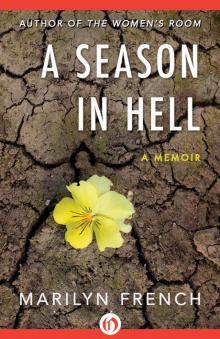 A Season in Hell
A Season in Hell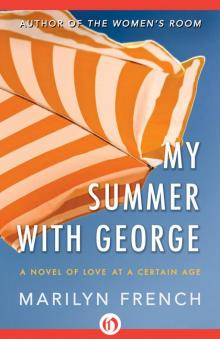 My Summer With George
My Summer With George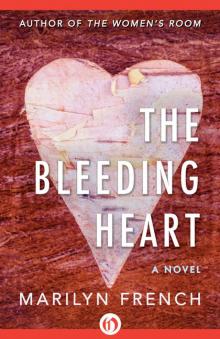 The Bleeding Heart
The Bleeding Heart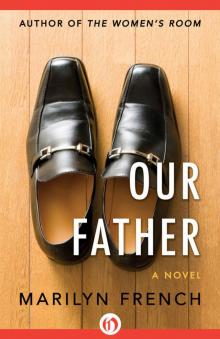 Our Father
Our Father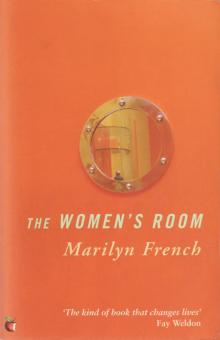 The Women's Room
The Women's Room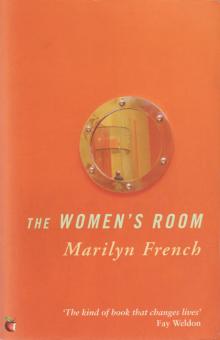 The Women's Room (Virago Modern Classics)
The Women's Room (Virago Modern Classics)